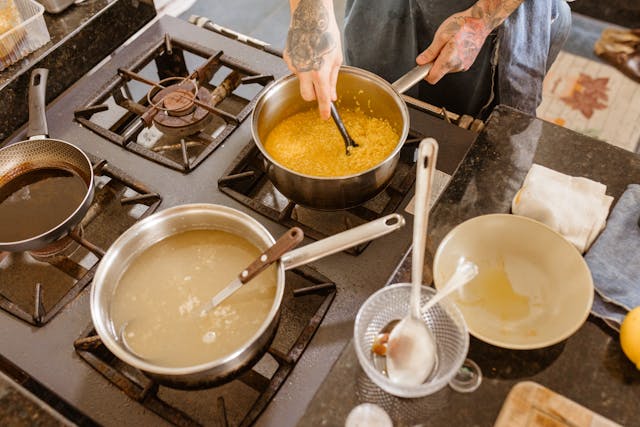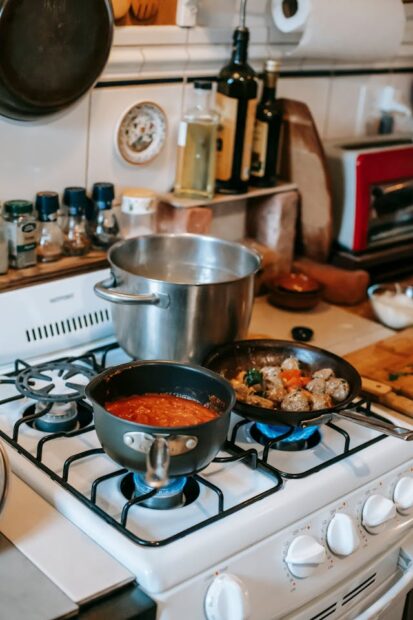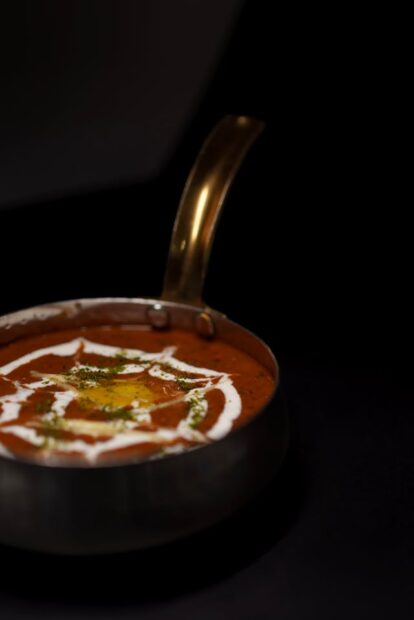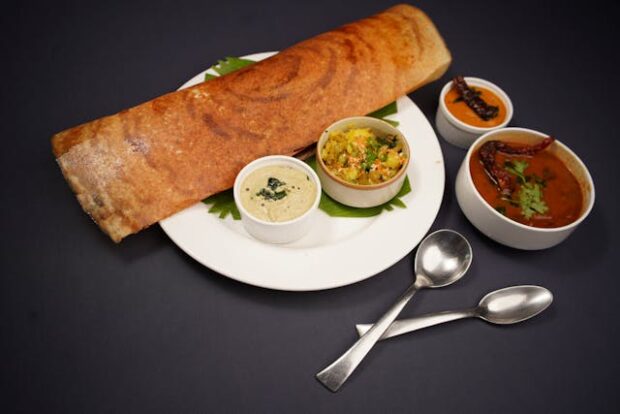
The art of cooking involves a blend of techniques, high-quality ingredients, and creativity, all working in harmony to produce a great dish. Whether you’re a novice or a culinary enthusiast, mastering foundational cooking methods and understanding ingredient basics can elevate your meals from ordinary to extraordinary. This guide will walk you through essential skills and tips to improve your cooking and help you create a solid culinary foundation.
Essential Cooking Techniques to Master
Learning and refining basic cooking techniques allows you to handle a variety of recipes and experiment confidently in the kitchen. Let’s take a look at some foundational techniques that every cook should know.
1. Sautéing
Sautéing is a quick and flavorful way to cook vegetables, meat, and seafood. This technique uses high heat and a small amount of oil to cook ingredients quickly, preserving their texture and color. A heavy-bottomed pan, such as a cast iron skillet, is ideal for sautéing because it retains heat well.
2. Roasting
Roasting intensifies the flavors of vegetables and proteins by using dry heat. To achieve a golden-brown crust, use a high temperature (400°F or higher) and spread ingredients evenly on a baking sheet. Roasting is perfect for enhancing the natural flavors of root vegetables and cuts of meat.
Explore this guide on how to roast vegetables for helpful tips.
3. Braising
Braising combines searing and slow cooking in liquid to make tough cuts of meat tender and flavorful. Often used for meats, braising can also elevate vegetables, beans, and even fruits. With a little patience, braising transforms ingredients into rich, melt-in-your-mouth dishes.
Learn more about braising techniques and explore recipes to master this skill.
4. Knife Skills
Proper knife skills are fundamental to efficient cooking. Learning to dice, chop, julienne, and slice precisely can speed up meal prep and ensure uniform cooking. High-quality knives, regular sharpening, and practice can make a world of difference in your kitchen experience.
For beginners, this guide on knife basics is an excellent place to start.
Selecting High-Quality Ingredients
No matter how skilled you are in the kitchen, using fresh, quality ingredients is key to enhancing flavors. Here’s how to choose some basic ingredients that can make or break a dish:
- Produce: Buy fruits and vegetables that are in season for peak flavor and nutritional value. Local farmers’ markets often have fresher options than supermarkets.
- Proteins: Freshness is critical for meat and fish. Look for clear eyes, firm flesh, and a lack of strong odors in fish.
- Spices and Herbs: Fresh herbs and spices can elevate even simple dishes. Whole spices, stored properly, maintain their flavor longer than ground spices.
To learn more about seasonal produce, check this seasonal food guide.
Understanding Flavor Balancing

An essential aspect of cooking is learning to balance flavors—sweet, salty, sour, bitter, and umami. Each flavor adds depth to a dish, and understanding how to incorporate them can lead to remarkable culinary creations. For example, a splash of vinegar can brighten a soup, while a pinch of sugar may balance the acidity in tomato sauce.
Explore tips for flavor balancing to learn how to enhance your dishes effectively.
Experimenting with Seasoning and Marinades
Marinating is an effective way to infuse flavors into meats and vegetables before cooking. A basic marinade includes an acid (like lemon juice), oil, and seasonings. Allow meats to marinate for a few hours to get optimal flavor, but avoid over-marinating, which can alter texture.
Experiment with different marinades and seasonings to personalize your dishes, and check out these marinade recipes for inspiration.
Plating and Presentation
While taste is the primary focus, the presentation also plays an important role in the dining experience. Simple plating techniques, like balancing colors, textures, and garnish placement, can make a dish look as good as it tastes.
For more plating tips, check out this guide on food presentation.
Conclusion
Cooking is a rewarding skill that brings joy to both the chef and those who enjoy the results. By mastering foundational techniques, understanding the importance of ingredients, and experimenting with flavors, you can elevate your cooking and create dishes that are both beautiful and delicious.
#TrendingNow #InspirationDaily #ExploreMore #LifestyleTips #InTheNews #DigitalAge #Insights #Innovation #BehindTheScenes #WorldView #Digital #forensic #postyhive












Be the first to leave a comment